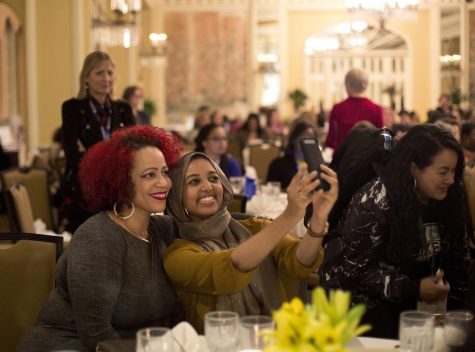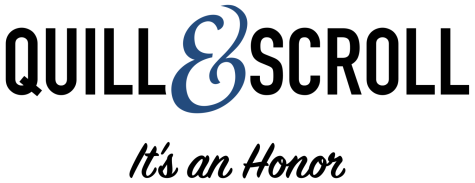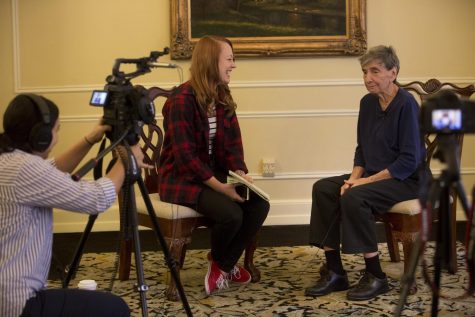Women in Journalism
Your official permission to be a know-it-all
By Roxann Elliott, Journalism and Women Symposium
For Quill and Scroll Magazine
A week before I began my freshman year of high school, the senior girls invited all the incoming freshman girls to a welcoming party. We were, naturally, terrified.
We imagined all manner of humiliating hazing rituals, and anyone who’s recently emerged from middle school can understand why. Junior high is a disorienting swamp of insecurity and preemptive cruelty. However, we were assured this was a sincere overture of friendship and comradery. And that the senior parents would be supervising. Also, our parents made us go.
Turns out, it was an amazing experience. The senior girls shared tips for navigating high school (literally, navigating, as in “The halls are like a highway, always walk on the right-hand side.”), advice on building healthy friendships with other girls, and even some dopey trust exercises that had us in hysterics.
Today, I’m An Adult™ working with the Journalism and Women Symposium (JAWS), a nonprofit organization that provides mentorship, training, and shared wisdom for women in journalism. Our greatest challenge, year on year, is convincing members to step up and serve as mentors.
This begs the question: Why are these talented journalists more reluctant to share their insight and experience than a group of teen girls? I can’t pretend to have all the answers, but I thought we could start with encouraging young people to continue doing what they’re doing – building networks and democratizing knowledge.
What follows are just a few of the reasons young people, and young journalists in particular, ought to take up the mantle of mentors.

Diversity Fellow Nesima Aberra, right, catches a selfie with Nikole Hannah-Jones, the keynote speaker at the Journalism and Women Symposium’s 2017 Conference and Mentoring Project (CAMP) in Hot Springs, Arkansas on Oct. 28, 2017. (Photo/Erica Yoon)
You know more than you realize
Look, I don’t want to encourage any more unwarranted confidence than is already inherent in being a teenager. No, you don’t know everything – but own what you do know. Student newsrooms experience rapid turnover by design, and the more you share information the stronger your publication will be over time.
With each new class of student reporters, make a sincere and intentional effort to spend time with those junior to you. Share the tips you’ve developed and the tools you’ve discovered. And don’t limit your interaction to a one-time, formal orientation. It’s often during organic, informal conversation you’ll recall pertinent anecdotes, obscure facts that didn’t seem relevant at the time, and the institutional wisdom shared from your own upperclassmen.
You’ll make a profound difference in the lives of younger reporters and in the legacy of your newsroom.
You can mentor and be mentored at the same time
I don’t want to further the stereotypical narrative that women are wilting flowers who downplay their skills or underestimate their talents. Many, no doubt, do, but I propose that just as many women are aware of their skill but are also preternaturally curious, themselves, and never feel their own education is complete enough. They continue seeking knowledge, never quite satisfied they know enough to start imparting that wisdom to others
So, when an organization like JAWS, which boasts so many phenomenally accomplished women, receives dozens upon dozens of requests to be a mentee and struggles to expand beyond the same 20 or 30 mentors, I want to tear my hair out.
You can do both. You can be a voracious learner and a guide to those less experienced than you – get this – at the same time. You can also develop lateral mentoring relationships – swapping skills and experiences between peers across mediums, beats, and technologies.
Ain’t nobody going to tell you when you’re ready
I don’t have the receipts, but as a human humaning in the world, I carry the sneaking suspicion that many people shy away from mentoring because it sounds so official. Few people who are tolerable to be around consider themselves an authority on a given subject, and the title “mentor” carries some gravitas.
In short, people are almost scared of calling themselves A Mentor™ – scared of being an imposter. I’m not allowed to use bad words, here, so I’ll channel former Vice President Joe Biden and say, that’s a bunch of malarkey.
As long as you’re a living, breathing human being, you’ll never feel like you’re done learning, and no one is going to thump you with the magical authority stick and confer upon you the title of “mentor.”
Don’t draw the line at professional skills
One thing JAWS recognizes is the interconnection between journalists’ personal and professional lives. The members take seriously the intangibles that shape and propel their work. I feel like it’s a unique strength of the group among journalism organizations. In high school, this consideration is doubly crucial.
Attrition among women in journalism is endemic, and it starts as early as high school. According the Student Press Law Center’s Active Voice initiative, a study by researchers at the University of Kansas showed that 41 percent of high school girls were told by a school employee not to report on a given topic, compared to 28 percent of boys.
Add to that the pressures and prejudices faced by young people of color, and some of the most needed voices in journalism will be silenced before they ever leave school.
Lastly, young people are not immune to the hardships of the adult world. Homelessness, domestic abuse, and neglect are more common than they ought to be, and the skills needed to cope with these problems aren’t instinctive. As a peer, you have the power to listen, support, and fortify the most vulnerable in your newsroom.
Fuel for change
In summary, mentorship (which is really just fancy branding for “being a pal”) is the fuel for change. As we watch teens on the news taking politicians to task and proving once again how undervalued and underestimated young people are, it can be a struggle for high school journalists to navigate the tension between reporting and activism. Especially when both are such crucial civic pillars.
For burgeoning reporters, mentoring and being mentored is how we remain focused, share crucial insight, find inspiration, and deepen the context in which we report.
Those high school girls didn’t have to reach out to us – to ease our transition into high school. They had their own lives, their own insecurities and concerns, and I’m certain none of them felt all-knowing as they stared down the biggest transition of their lives and the decisions that would shape their adulthood. No one is ever ready. You have something to offer today, whether you’re 17 or 70. Please don’t wait until you’re 70.
Read more about the JAWS mentoring program.

